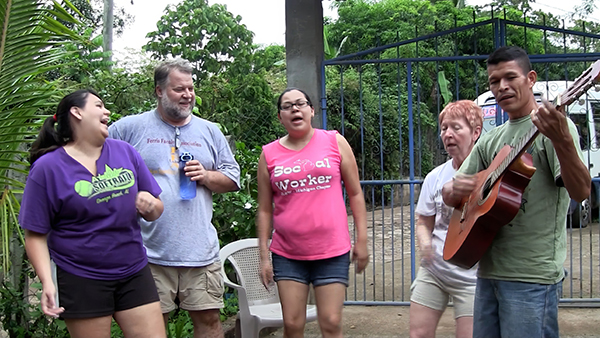
Ferris State University Social Work Professor Michael Berghoef is shown here during
his travels to Central America as part of the El Salvador project funded in part by
The Ferris Foundation.
Preserving and archiving battlefield video and testimony from people who endured mass violence in El Salvador to help future generations understand the impact of such atrocities will continue at Ferris State University, supported by a Merit Grant awarded by The Ferris Foundation.
Social Work professor Michael Berghoef said a previous Merit Grant allowed him to acquire various recorded materials of regional battles and witness accounts of the country’s civil war. About 75,000 people were killed between 1980 and 1992 when government forces conducted massacres, landmine placements, bombings and summary executions.
In November, Berghoef met leaders of the Shoah Foundation and the Institute for Visual History and Education at the University of Southern California. The nonprofit organization is dedicated to making audio-visual interviews with survivors and witnesses of the Holocaust and other genocides.
The foundation has 56,000 testimonies from El Salvador archived.
“If we include the Salvadoran stories we have gathered, that would represent the 10th country to be archived and serve as only the second group of testimonies from Central America, joining the Guatemalan collection,” Berghoef said.
Berghoef said Ferris State alumnus and philanthropist Mickey Shapiro gave the university access to the Shoah Archive, making Ferris State one of three universities in Michigan and among the fewer than 200 full-access sites worldwide for the video histories.
Shapiro has been a strong supporter of the Shoah Foundation’s efforts. USC and the foundation in March announced the first Mickey Shapiro Endowed Chair in Holocaust Research is expected to be seated in 2025.
“Many of our videos are in their original unmediated technological state, and to be included in the archive, they will require translation, transcription, captioning, time stamping, geocoding and incorporation of keywords,” Berghoef said. “We will be turning to Wes Thompson of Ferris’ Media Production team to complete the processing, which has already begun. This submission needs to move on to researchers with the Shoah Archive, who would determine whether they would be included by 2024. That would be a successful result for a process that began in Summer 2018.”
If the USC Shoah Foundation chose not to fully include the Salvadoran video testimonies for its archive, Berghoef would explore other archives, such as the Unfinished Sentences project at the University of Washington, the El Salvador Memory project at Western University in Ontario, and the Ferris Institutional Repository.
Berghoef appreciates the donor support that has helped make this work possible.
“We hope to see that this material has an appropriate venue to reach scholars, students, and others who would benefit from its availability and make these important Salvadoran testimonies heard,” he said.

